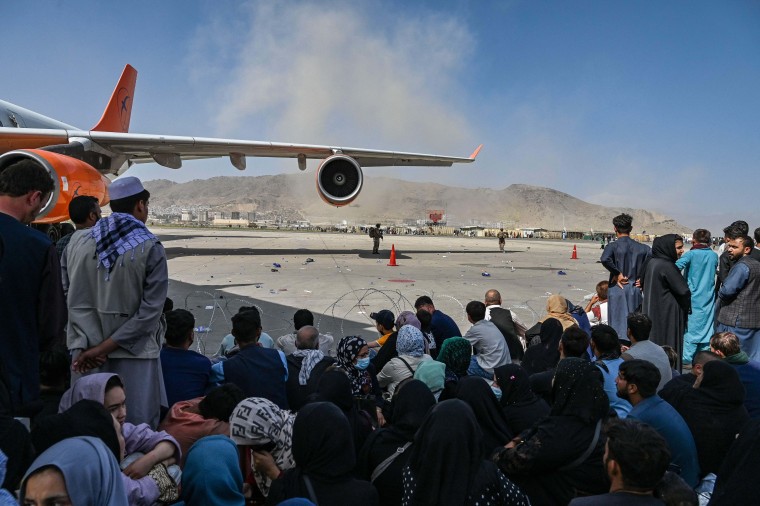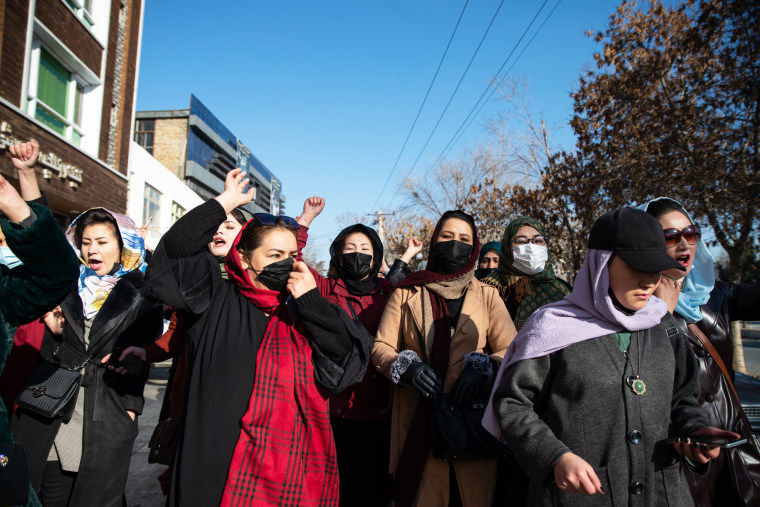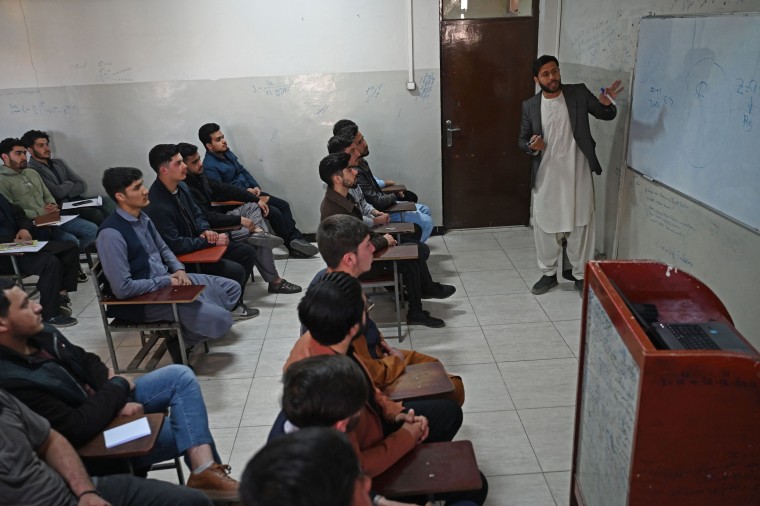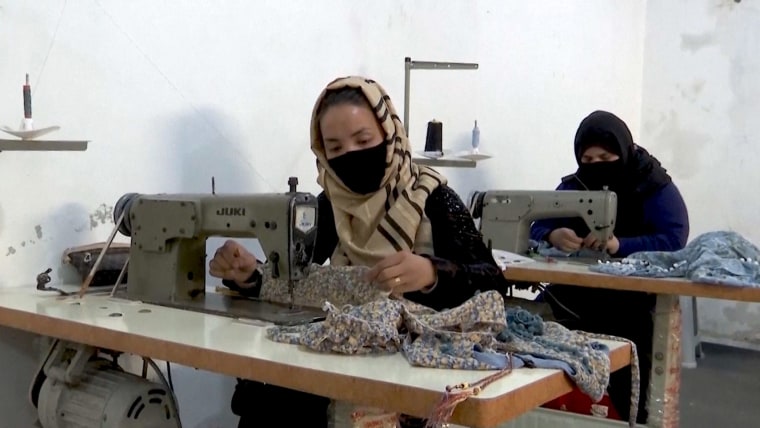[ad_1]
Inspired by their mother, Afghan sisters Sadaf and Zolheja dream of becoming businesswomen. But for now, only Sadaf appears poised to fulfill that ambition, while Zolheja has been thwarted by the Taliban’s ban on women attending universities.
“It seems that I have to bury all my goals,” Zolheja, 19, told NBC News via WhatsApp from her home in Afghanistan’s capital, Kabul, earlier this year, adding that she has been forced to give up her business management course after the ban came into effect last month. (NBC News has verified the sisters’ identities but agreed not to use their last name because they fear reprisals from the Taliban.)
She said she now spends her days “thinking, crying, searching and trying to apply for scholarships so that I can get the chance to go somewhere else to study.”
“I will go anywhere,” she said.
Her older sister, Sadaf, 21, said that she was evacuated from Afghanistan in August 2021, shortly after the Taliban seized power. She added that she was eligible to emigrate to the United States because of her work at a nongovernmental organization that focused on education and is now studying business management on a scholarship at the University of Tulsa in Oklahoma.
“I had to do this, I had to come here to support my family,” she said.

Though the Taliban initially promised a more moderate rule and pledged to respect the rights of women and minorities, they have implemented their strict interpretation of Islamic law, or the Sharia, since they took control. As a result, the country has become the most repressive in the world for women and girls, deprived of many of their basic rights, the United Nations said Wednesday.
Women have been barred from most fields of employment, ordered to wear head-to-toe clothing in public and prevented from using parks and gyms. After banning girls from middle school and high school last spring, the Taliban began enforcing a higher education ban on women in December by blocking their access to universities.
Zolheja said she found out about the ban when she arrived at her university and was blocked from entering, along with many other female students.
“The day that they announced the ban, I felt like they killed us,” she said. “We are humans, we need to live the way we want to, not the way that Taliban wants us to live.”
Her mother was particularly sad for her, because her own dreams had been crushed after the Taliban implemented a ban on female education after they first came to power in 1996, she said.
“She had this experience before and knows how much it hurts,” Zolheja said.

Sadaf added that their mom had wanted to resume her studies after the U.S.-led invasion in 2001, prompted by the Taliban’s refusal to hand over Osama bin Laden, the Al Qaeda leader and mastermind of the 9/11 terrorist attacks.
At the time, access to education became available for women across the country but, Sadaf said, she could not obtain documents proving that she had already completed the majority of her studies and did not want to start over again.
Instead, Sadaf said, their mom stayed home and shouldered the chores “just so we could focus on our studies.”
Their father was also supportive of their educational endeavors, she said, adding that he didn’t want them to be “women who are just inside the house, cooking and cleaning.”
“I’m so grateful that I have parents like them,” she said.
That support didn’t waver after the Taliban took over and, after some emotional conversations as a family, they decided it was best for her to leave the country with the help of her NGO.
“I was just trying to escape Afghanistan,” she said, adding that their goodbye was rushed as she embarked on what would be her first trip outside the country from Kabul International Airport.
Through tears, her mother told her to “stay safe,” Sadaf said, weeping as she recalled their parting.
She added that she called her mother from the plane and told her, “I’m flying.”
After touching down in Qatar, she flew to the Ramstein Air Base in southwestern Germany, before making her way to Washington, D.C.. From there, she went to Texas and then to a camp in New Mexico where she stayed for nearly two months. Finally, she said, she headed to her new home in Tulsa, where she knew people affiliated with the NGO she worked with in Afghanistan. (A U.S. official with knowledge of Sadaf’s journey confirmed it to NBC News.)
Her first real home in the U.S. was a dorm at the University of Tulsa, which had started a support program for fleeing Afghans. A job as a case manager and interpreter at a resettlement agency soon followed, before she was accepted to the university on a full scholarship.

Sadaf said she missed “everything” about her homeland, especially her family, and the adjustment to life in Oklahoma had been difficult. But while also studying English, she earned a 4.0 GPA her first semester.
Currently in the U.S. on a humanitarian parole status, she said she was applying for asylum and hopes to apply for a green card. Eventually, she said, she hopes to bring her family to the U.S. and there are several ways she could do this including the new Welcome Corps program, launched by the State Department last month, which will allow private U.S. citizens to sponsor refugees.
Back in Afghanistan, the ban on female education remains in place despite international condemnation from Western countries, as well as more hard-line Muslim majority nations. Along with Turkey, Qatar and Pakistan, Saudi Arabia — which until 2019 enforced sweeping restrictions on women’s travel, employment and other crucial aspects of their daily life including driving — urged the Taliban to change course.
The ban also triggered several protests inside Afghanistan, where just over 100,000 of the country’s 20 million women were enrolled in higher education in 2021, according to data collected by the country’s Education Ministry and published by its National Statistics and Information Authority in May.
So far, the Taliban have shown little sign of reversing the policy, along with a separate ban on Afghan women from working at nongovernmental organizations that it also introduced last month. The group claimed female workers were not wearing the Islamic headscarf correctly.
Several senior members of the Taliban declined to comment when asked about whether they will restore education for women and girls. They also declined to comment on whether women and girls would be allowed to work for NGOs.
While some Western institutions are running virtual courses for Afghan students, in 2020 only 18% of Afghans had internet access, according to the latest available data from the World Bank.
As a result, Zolheja said she felt like “a bird inside a cage who wants to fly but can’t,” adding, “I feel like I don’t have any reason to live and any good future to be waiting for.”
While Sadaf’s future seems a lot brighter, she remains saddened by her sister’s plight and that of other women in her homeland.
The sisters chat via text when they can — but Sadaf said that when she is alone, thoughts flood her mind about her family’s future, Zolheja’s especially.
“Just staying at home and not doing anything, it bothers me and my sister a lot,” she said. “I can’t do anything for her, that’s what saddens me.”
[ad_2]
Source link

